In the chain of lesser known Balkan countries of the Other Europe, as we like to call it, our knowledge of Bulgaria was rather spotty at best. What do you know about it? If you are a tennis fan, like me, you may know Grigor Dimitrov, quite gifted, but not very accomplished Bulgarian tennis player. He was better known in the media for being a short term boyfriend of the very accomplished Maria Sharapova. Which clearly is not enough to ensure huge crowds of tourists pouring into his country even at the top of the summer season. But the latter is exactly the right reason for us to visit. We love the road and the country less travelled. My personal history with Bulgaria goes far back into my youth with a few memorable trips to Bulgaria’s mountain ranges I “conquered” with my college drinking buddies.
of the very accomplished Maria Sharapova. Which clearly is not enough to ensure huge crowds of tourists pouring into his country even at the top of the summer season. But the latter is exactly the right reason for us to visit. We love the road and the country less travelled. My personal history with Bulgaria goes far back into my youth with a few memorable trips to Bulgaria’s mountain ranges I “conquered” with my college drinking buddies.
But while I longingly (and perhaps too frequently) rehashed those memories (ah, to be young again with a big backpack on your back) this trip is not about mountains. With the help of my art historian spouse acting also as a wine connoisseur I was looking forward to upgrading my image of Bulgaria, through cultural historical experiences. 
Just as we crossed the Bulgarian border we had to make an unscheduled stop as the brown tourist sign for historical fortress flashed by on the side of the road. We crossed from (Northern) Macedonia, which is considered by many in Bulgaria a rightful part of Bulgaria (as it is the case in Greece). Alas in general, it is a common feature of national identities of many Europeans to feel that some part of their country was at some point stollen by their neighbors, and this transgression could never be forgiven, (while the parts we stole are rightfully ours)!!!.
So right across the border we found an ancient grove of gnarled trees  and across a small Strumica river a very moving Memorial to the Bulgarian King Samuil still holding on to his regalia
and across a small Strumica river a very moving Memorial to the Bulgarian King Samuil still holding on to his regalia 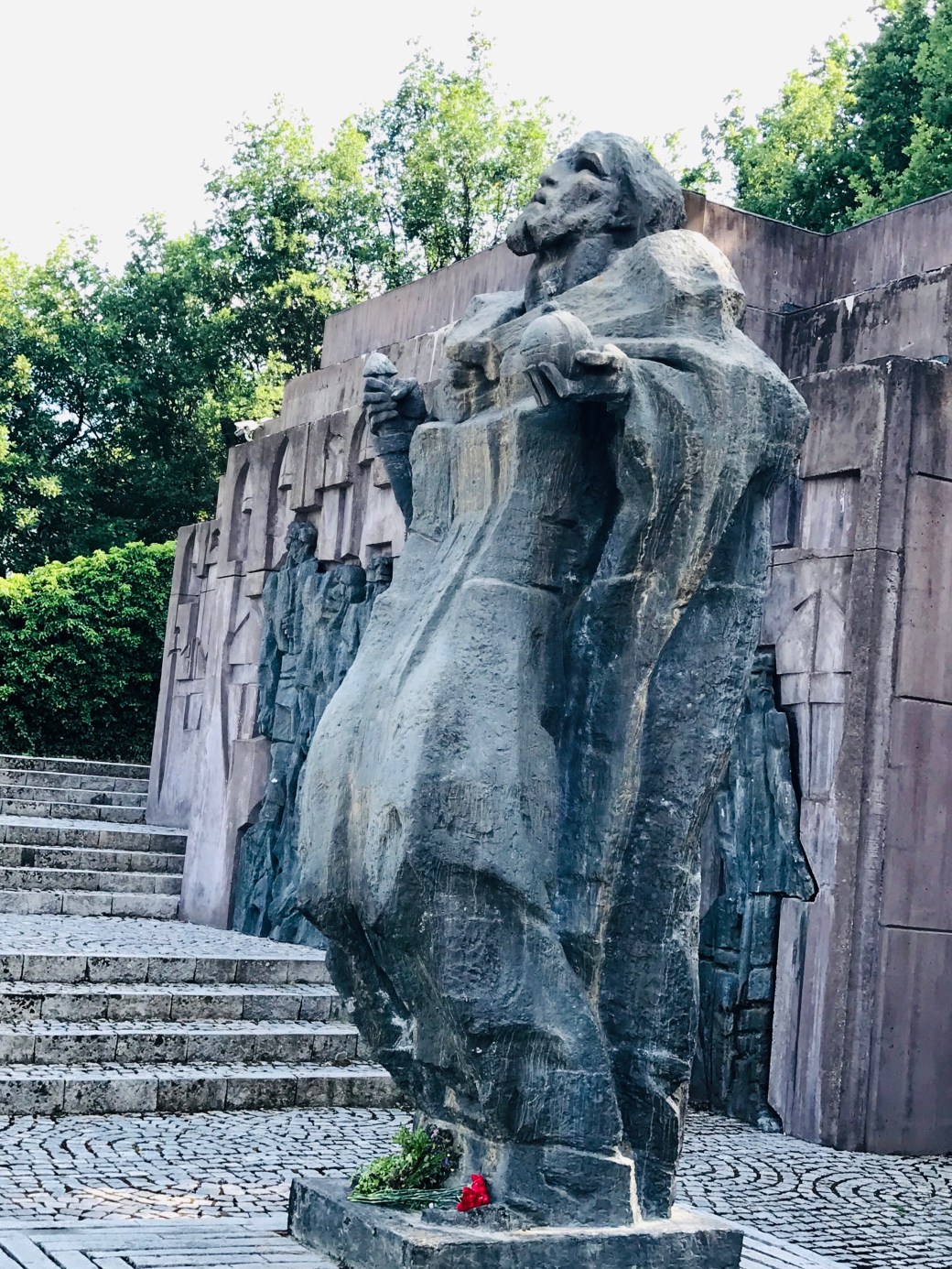 at a place of 1014AD Battle of Kleidion where the Byzantine army finished off the First Bulgarian Empire.
at a place of 1014AD Battle of Kleidion where the Byzantine army finished off the First Bulgarian Empire.  If you look closer you can see the blindfolds on the two flanking solders. They are not blindfolds but bandages, because when Vasilius II defeated the Bulgarian army, he captured 14,000 soldiers and had them blinded with only every 100th soldier left with one eye to lead them home. Instead of killing your prisoners you use them to put burden on the state’s (=Veteran’s administration) coffers and families since they will now have to be taken care for the rest of their lives. It is said that at the sight of his returning soldiers Samuel had a heart attack and died. Lest you may feel overly sympathetic to the poor king, let me inform you that he had his brother and his whole family butchered for alleged treason. Well, not all, his son asked him to spare his favorite cousin, which Samuel did. Big mistake! After Samuel’s death a year into his son‘s reign as the new king, the very same cousin murdered him on a hunt. Nice people!
If you look closer you can see the blindfolds on the two flanking solders. They are not blindfolds but bandages, because when Vasilius II defeated the Bulgarian army, he captured 14,000 soldiers and had them blinded with only every 100th soldier left with one eye to lead them home. Instead of killing your prisoners you use them to put burden on the state’s (=Veteran’s administration) coffers and families since they will now have to be taken care for the rest of their lives. It is said that at the sight of his returning soldiers Samuel had a heart attack and died. Lest you may feel overly sympathetic to the poor king, let me inform you that he had his brother and his whole family butchered for alleged treason. Well, not all, his son asked him to spare his favorite cousin, which Samuel did. Big mistake! After Samuel’s death a year into his son‘s reign as the new king, the very same cousin murdered him on a hunt. Nice people!
You may remember from our previous blog that this is the same king who built his summer palace on one island of Lake Prespa (now Northern Macedonia), and has his grave on another island of the same lake (now Greece) and was most probably of Armenian parents and certainly had an Armenian wife and an Armenian son in law. (Who by the way was Samuil’s Byzantine prisoner until his daughter fell in love with him. He let her marry him. Big mistake! At first opportunity they ran off to the other side in the process giving access of Samuil’s biggest sea port to the enemy.) Ah, history is full of such back stabbing, deceit and treachery, nowhere more so than on the Balkans.
The Balkans and with extension the Middle East is unfortunately far from a gently simmering melting pot of nationalities, but instead was and is a powder keg, ready to explode at the slightest provocation. No wonder there is a mess when everybody wants to claim that whatever was “accomplished” in his neighborhood in the last few thousand years was done in the name of God (preferably my God) and as such is only a byproduct to support ideology of whatever (preferably our) government. The others with their God and ideology have done them wrong.
So it comes even more as a surprise how often the battles lost are remembered, marked, and celebrated over those we
won (way too few, maybe?).  I find that we, Slavs, in particular have such lamenting tendencies. We compose many popular crying folk songs wailed loudly after a certain alcohol level in our veins is reached. There are national heroes and national myths created, only remotely reminding of historical reality. They spread over years and centuries from one to the next generation until they become FACTS. This game never stops as long as it serves the political purpose and expediency and can easily be misused as a call for revenge.
I find that we, Slavs, in particular have such lamenting tendencies. We compose many popular crying folk songs wailed loudly after a certain alcohol level in our veins is reached. There are national heroes and national myths created, only remotely reminding of historical reality. They spread over years and centuries from one to the next generation until they become FACTS. This game never stops as long as it serves the political purpose and expediency and can easily be misused as a call for revenge. 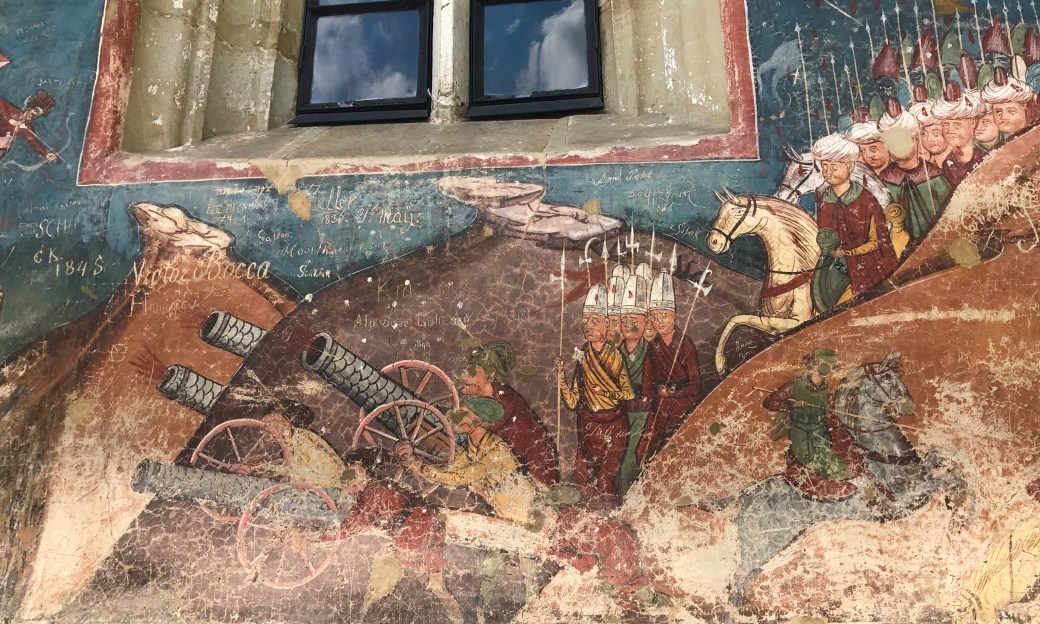 This lost battle was one of many followed by others on: Kosovo 1389AD (Serbs against Turks), Mohács 1526AD (Hungarians against Turks), and White Mountain 1620AD (Czechs against Austrian Habsburgs). We Czechs have been crying and whining over this defeat now for almost 400 years and those grievances, for at least some, have not been settled yet and may still deserve blood to be sprinkled over patriotic soil. Let us hope against hope we learn our lessons and we start celebrating our histories and composing more upbeat songs, keeping blood on all sides cool enough as we move forward.
This lost battle was one of many followed by others on: Kosovo 1389AD (Serbs against Turks), Mohács 1526AD (Hungarians against Turks), and White Mountain 1620AD (Czechs against Austrian Habsburgs). We Czechs have been crying and whining over this defeat now for almost 400 years and those grievances, for at least some, have not been settled yet and may still deserve blood to be sprinkled over patriotic soil. Let us hope against hope we learn our lessons and we start celebrating our histories and composing more upbeat songs, keeping blood on all sides cool enough as we move forward.
The first true Bulgarian I met who expressed clearly more than lukewarm feelings towards me was this stray buddy abandoned by his rightful local owner.  I offered him some food and made a selfie on his behalf. One good deed a day always feels good. Let us be positive from now on.
I offered him some food and made a selfie on his behalf. One good deed a day always feels good. Let us be positive from now on.
Easy to accomplish with the prospect of entering the town
of Melnik, home of famous Melnik wine. You might have never heard of it, but Mr. Winston Churchill did, and I understand was in the habit of ordering a large amount every year throughout his life.
I visited this town some 45 years ago while finishing a grueling 7 day North to South Pirin Mountain trek. 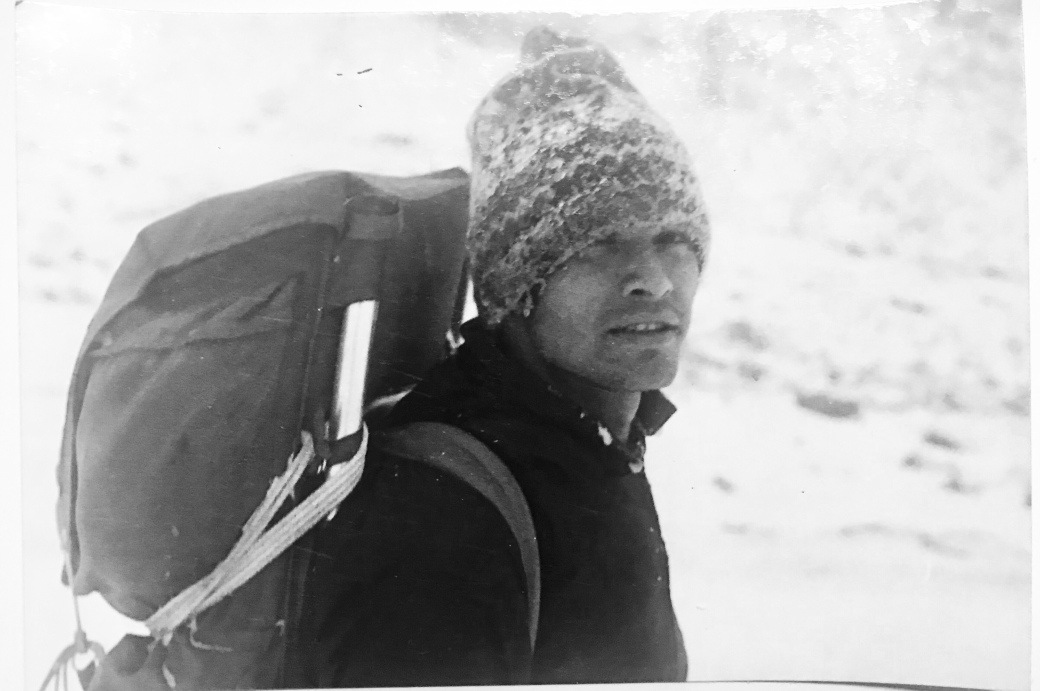 My archive photo from autumn 1974 can give you a good feel for this snow and miserable weather filled experience.
My archive photo from autumn 1974 can give you a good feel for this snow and miserable weather filled experience.
I vividly remember exhaustedly stumbling into town, looking for nothing more than some decent non canned food, and some famous Melnik wine. After a week of exclusive male companionship (7 wet and stinky guys) I was not necessarily adverse to female participation in social activities such as drinking and singing, to be clear.  This time waltzing in on four wheels we were fresh and eager to discover art, architecture, history and culture. We found it invariably intertwined with wine. There was a big Wine Museum in an underground stone wine cellar, a rich merchant’s beautifully restored traditional house with an active wine cellar and Rozhen monastery with old grape trellises.
This time waltzing in on four wheels we were fresh and eager to discover art, architecture, history and culture. We found it invariably intertwined with wine. There was a big Wine Museum in an underground stone wine cellar, a rich merchant’s beautifully restored traditional house with an active wine cellar and Rozhen monastery with old grape trellises.  We wondered if the angels imbibed some as they naughtily snatched crowns away from royalty.
We wondered if the angels imbibed some as they naughtily snatched crowns away from royalty.  An attractive and pretty town on its own, Melnik has a decent development of the tourist facilities. Unfortunately the roads are not among them yet, even the one leading to the Zornitza Family estate (of the Relais & Chateau fame), surrounded by a large vineyard. We were personally welcomed and guided by the Director of Marketing,
An attractive and pretty town on its own, Melnik has a decent development of the tourist facilities. Unfortunately the roads are not among them yet, even the one leading to the Zornitza Family estate (of the Relais & Chateau fame), surrounded by a large vineyard. We were personally welcomed and guided by the Director of Marketing,  and I can assure you, our and his time was not wasted as we descended into the vineyard cellars, went through a quick review of operation’s history, plans for the future, and were even introduced to the Bulgarian information industry tycoon, who invested some of his fortune into this luxury venture.
and I can assure you, our and his time was not wasted as we descended into the vineyard cellars, went through a quick review of operation’s history, plans for the future, and were even introduced to the Bulgarian information industry tycoon, who invested some of his fortune into this luxury venture.
The best part, as always, was my wife tasting and discussing a wide array of wines and me taking photos.  The knife in my spouse’s hand may look like she is ready to slice a piece of local cheese, but it also adds heavily to the strength of her arguments. Exhausted by the alcohol and culinary intake we more than happily withdrew to recuperate by the pool of another (much more affordable) winery Boutique hotel Sintica in the town of Sandanski.
The knife in my spouse’s hand may look like she is ready to slice a piece of local cheese, but it also adds heavily to the strength of her arguments. Exhausted by the alcohol and culinary intake we more than happily withdrew to recuperate by the pool of another (much more affordable) winery Boutique hotel Sintica in the town of Sandanski.  We could enjoy the company of young Bacchus and just around the corner from the hotel we discovered a large if lonely also half naked statue of Spartacus. Huh? In Bulgaria? I always thought Spartacus was Greek, didn’t you?
We could enjoy the company of young Bacchus and just around the corner from the hotel we discovered a large if lonely also half naked statue of Spartacus. Huh? In Bulgaria? I always thought Spartacus was Greek, didn’t you? 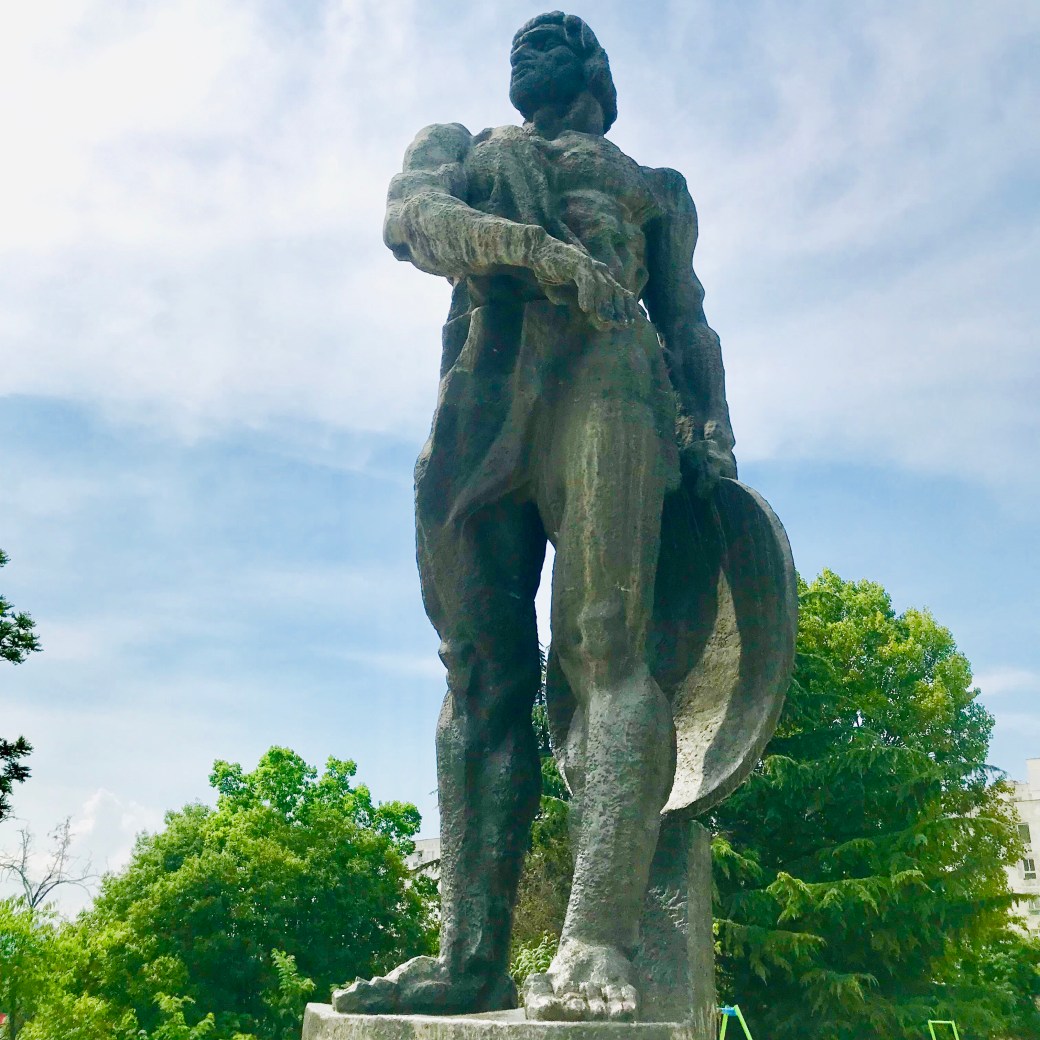 Turns out he was actually Thracian, a Roman mercenary who defected and was then caught and sold at a place called Sklave (meaning Slave) which was a big slave market in Roman times, now a tiny village just around the corner. Some say he was born there too, and his wife, who was a Thracian prophetess, was enslaved with him. It makes sense to me that he would have run back to his birthplace and family.
Turns out he was actually Thracian, a Roman mercenary who defected and was then caught and sold at a place called Sklave (meaning Slave) which was a big slave market in Roman times, now a tiny village just around the corner. Some say he was born there too, and his wife, who was a Thracian prophetess, was enslaved with him. It makes sense to me that he would have run back to his birthplace and family.
We came across Thracians when we stumbled upon a cool ancient tomb and cult building. 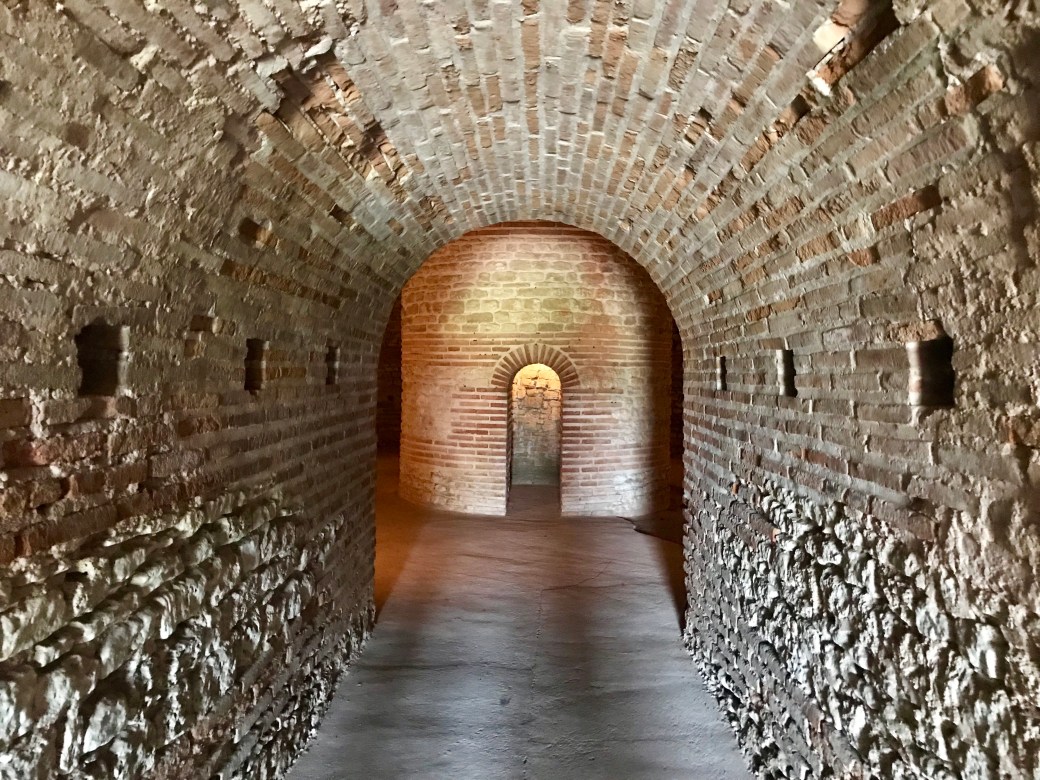 Thracians were a collection of many ferocious Indo-European tribes, sometimes described as red haired barbarians, living in the territory of modern Bulgaria and beyond. Their women were heavily tattooed and were formidable queens. They had some interesting habits: some had their husbands killed and some killed themselves when their husband died.
Thracians were a collection of many ferocious Indo-European tribes, sometimes described as red haired barbarians, living in the territory of modern Bulgaria and beyond. Their women were heavily tattooed and were formidable queens. They had some interesting habits: some had their husbands killed and some killed themselves when their husband died.
Of course, it would not be me if I would not have tried to rehash my past glory of mountaineering. Hence I forced this expedition’s Culture Director to go as far as the paved road allowed, then walked as far as I could until the parking lot could not be seen on the photo. After she took my snap shot 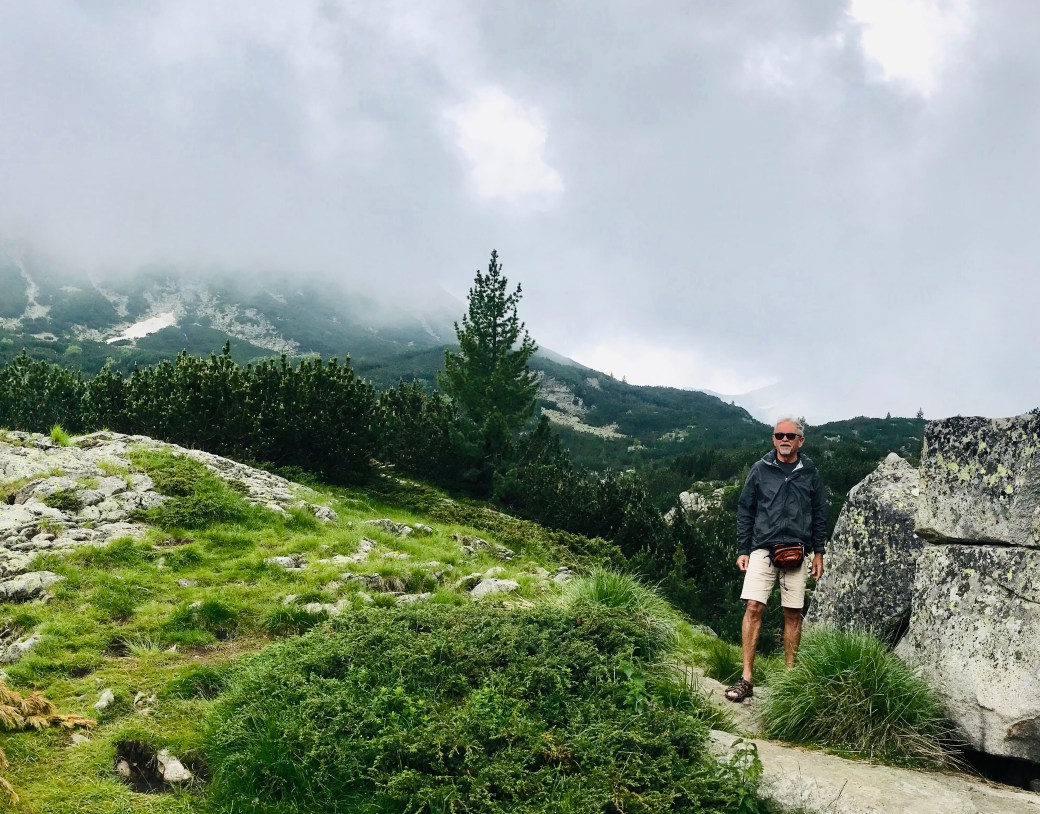 I was running back to the car as the heavy rain started providing us with a great excuse to back off, avoiding following example of some idiotic tourists walking in the mountains in inappropriate shoes, especially sandals!!! For the good deed of the day we gave a lift to two young German girls, caught in the storm.
I was running back to the car as the heavy rain started providing us with a great excuse to back off, avoiding following example of some idiotic tourists walking in the mountains in inappropriate shoes, especially sandals!!! For the good deed of the day we gave a lift to two young German girls, caught in the storm.
So we traded sports for culture and drove to the famous Rila Monastery to admire the striking architecture and richly painted walls.  In the rain the capital Sophia was even less attractive, so after the obligatory one night we pushed on towards Plovdiv in the middle of Thracian Plains.
In the rain the capital Sophia was even less attractive, so after the obligatory one night we pushed on towards Plovdiv in the middle of Thracian Plains.
There is a superbly and sensitively restored old Roman Amphitheater  worthy of visit even if you are hurrying in the middle of unbearable heat towards what you expect would be soothing cold waters of the Black Sea Coast.
worthy of visit even if you are hurrying in the middle of unbearable heat towards what you expect would be soothing cold waters of the Black Sea Coast.  Plovdiv turned out to be our favorite Bulgarian city, full of beautifully restored historical
Plovdiv turned out to be our favorite Bulgarian city, full of beautifully restored historical
buildings converted into boutique hotels, cozy restaurants and bars. How refreshing, when left behind by my hyperactive young companion, was to have the option of staying in a cool shaded place,  dreaming of a cold drink coming immediately after hitting comfortable sitting arrangement, but well before my treasurer would show up with a wave of magic wand called valet in her hand, asking me to hit the next cultural highlight.
dreaming of a cold drink coming immediately after hitting comfortable sitting arrangement, but well before my treasurer would show up with a wave of magic wand called valet in her hand, asking me to hit the next cultural highlight.
When we reached the Black Sea coast at Sozopol (ancient Apollonia) I realized yet again how unreliable youthful memories are. The beaches and the sea were much less attractive than I remembered and the coast was now, like in Albania, overdeveloped by ugly hotels and apartment buildings, frequented by dense crowds of families with children, happily buying overpriced blue ice cream and kitschy refrigerator magnets for sale on every corner.  Thankfully the incoming storm cleared the crowd and provided for a refreshing evening walk and a nice photo opportunity.
Thankfully the incoming storm cleared the crowd and provided for a refreshing evening walk and a nice photo opportunity.  We passed through bigger cities of Burgas and Varna quickly and hoped for a nicer experience in the small Nessebar with remnants of charming old churches. A decent cappuccino always improves the cultural experience .
We passed through bigger cities of Burgas and Varna quickly and hoped for a nicer experience in the small Nessebar with remnants of charming old churches. A decent cappuccino always improves the cultural experience . At the end, upon a recommendation of a Romanian friend we found a small stretch of attractive coast still not totally overrun.
At the end, upon a recommendation of a Romanian friend we found a small stretch of attractive coast still not totally overrun.  Then we left the country for Romania, what we thought was for good. Well, never say never. As we reached, after a few weeks of travel, the Romanian capital of Bucharest, we suddenly realized we were not too far from River Danube again and a place on Bulgarian side we missed on the first go. So feeling a bit guilty over our lack of enthusiasm for Bulgaria, we decided to give it another chance. We crossed the border and the river for the second time and drove to
Then we left the country for Romania, what we thought was for good. Well, never say never. As we reached, after a few weeks of travel, the Romanian capital of Bucharest, we suddenly realized we were not too far from River Danube again and a place on Bulgarian side we missed on the first go. So feeling a bit guilty over our lack of enthusiasm for Bulgaria, we decided to give it another chance. We crossed the border and the river for the second time and drove to
Veliko Tarnovo, once known as the City of the Tzars. It was the former capital of the Second (much longer) Bulgarian Kingdom between the 12-14th century. Just like the First it crumbled under pressure from its bigger, stronger neighbor, this time the Ottoman Turks. Located in a beautiful canyon cut mercilessly by the river Yantra  it is an architectural jewel. What a spectacular and secure setting. No wonder art and culture flourished.
it is an architectural jewel. What a spectacular and secure setting. No wonder art and culture flourished.  In the ruins of Tsarevetz we found a reconstructed Patriarchal cathedral with fascinating contemporary frescoes from the key moments of Bulgarian history, that were a wonderful surprise and a highlight of the trip.
In the ruins of Tsarevetz we found a reconstructed Patriarchal cathedral with fascinating contemporary frescoes from the key moments of Bulgarian history, that were a wonderful surprise and a highlight of the trip. 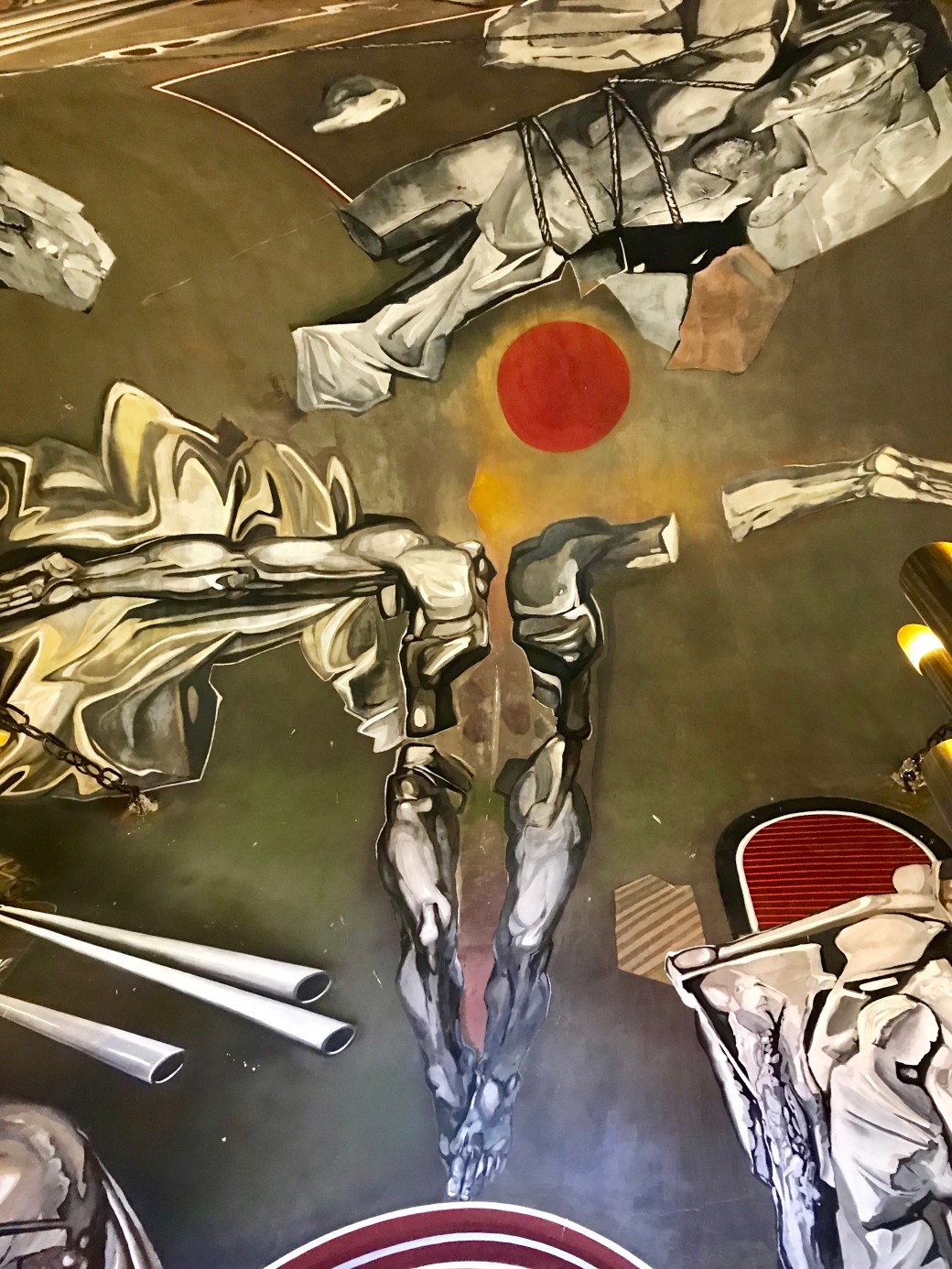 I am happy we dedicated a day to it even if it meant extra hours of driving. Another joy of traveling independently! You can change your plans and sidetrack or even double back and maybe right some preferential wrongs.
I am happy we dedicated a day to it even if it meant extra hours of driving. Another joy of traveling independently! You can change your plans and sidetrack or even double back and maybe right some preferential wrongs.

Eastern Europe is still largely a closed book to this South Westerner. You two are painting a beautiful and fascinating picture of it. The story of the blind army is wonderful and Plovdiv has been definitely added to our ever burgeoning list.
LikeLiked by 1 person
Thank you Billy! We appreciate your positive feedback as you are such a great storyteller.
LikeLike
Interesting. Glad you managed to visit pretty Veliko Tarnovo, which I saw in 2008, before heading along the Danube and cross-country to Varna. I was quite ill in Varna, but can remember sitting in a deck-chair, isolated, looking across at the Russian naval ships and the backdrop of hills to the sea.
LikeLike
Oh, it sucks to be sick on the road!
LikeLike
So fun to see the photo of Mirek back in the day!
LikeLike
A selfie of the dog!!!! I hope he enjoyed it as much as Mirek did. Your description of Bulgaria with the wine, food and art reminds me of my dear friend Rosette, who was a divine collage artist.
LikeLike
Moc pěkné, Mirku. Jako bych tam byla s vámi. Hanka
LikeLike
So is it a risk if Kristalina Georgieva becomes IMF boss?!? I wonder now! Serious question: how were the highways? I hear often than EU sponsored highways are usually not very long, because most of the money ended up in local politicians hands. Thank you for sharing the rich history and great pictures!
LikeLike
Sofia to Black Sea coast highway is pretty long, actually. I think the worse graft on freeways is in Czechia. The highest toll per km is in Slovenia. Portugal has the best roads I would posit.
LikeLike
PS the overpriced blue slushy…. sometimes I wonder if we should transfer our summer water time from Austria to the Black Sea- if my kids will just seek out the same temptations there, I think we will stay put and go East off season and for more than the beach!
LikeLike
Correct! We once told our grandson hankering after the blue ice cream that it was little blue Smurfs that were mushed up inside. 🤣Horrible grandparents that we are!
LikeLike
I’ve been watching Michael Palin’s New Europe series. Between him and you, I’m getting a better idea of some of these lesser known countries. I feel like i need to take a European history class again. When I was in school there was still a U.S.S.R. and a Yugoslavia! I am interested in the E.U. structure and how some countries are all in while others are not in (like Norway) but still have some rights / treaties / benefits? See, I have no idea how it works. Very interested though. Happy travels! xo, Jennifer
LikeLike
Yes, history can be interesting if it is taught well. Unfortunately many teachers just spew out dates and events. There are wonderful stories and then geopolitical alliances and ideas that shape the world. And of course intrigue as it is mere humans that shape history. Thanks for reading and going along on our travels.
LikeLike
Wow! So much interesting history – the story of the blind soldiers is so crazy!! But my favorite part was to see the vintage photo of Dad. Mom, watch it with that knife!!
LikeLike
I know. Such a handsome bugger!
LikeLike
I love this pic of you from the 70s dad!
Mom is even more formidable with a knife in her hand…
>
LikeLike
Wonderful storytelling spanning centuries of history! Reading the story of the blinded soldiers I couldn’t help to think of Game of Thrones. Great 70s pic!
LikeLike
I like that I get a little bit of a history lesson thrown in with the reading, more interesting than taught to me in my school days)….
Great pic of you backpacking in your 20’s, Mirek!
As always, I enjoy the photos and vignettes from the places and people you both have seen on your adventures!
LikeLiked by 1 person
Another superb page about a region I love. I really am loving this page more and more as I progress through it.
LikeLike
Thank you, that is very gratifying to hear.
LikeLiked by 1 person